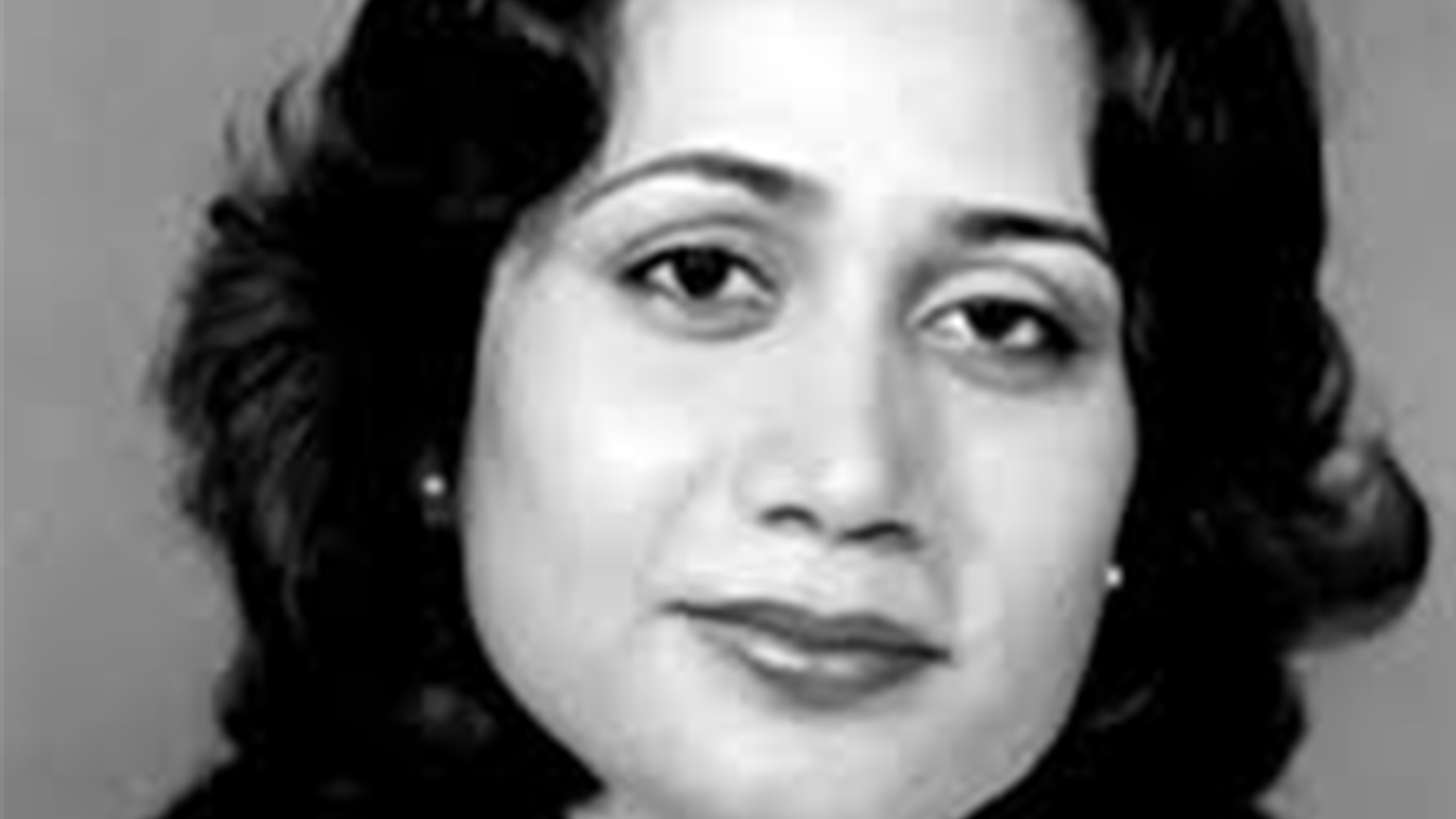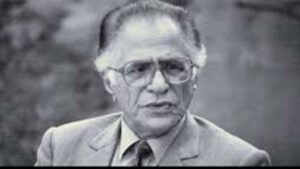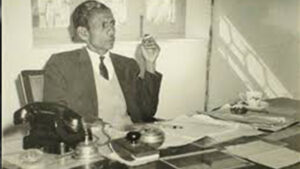Parveen Shakir (24 November 1952 – 26 December 1994) was a renowned Pakistani poet, teacher, and civil servant. She is celebrated for her poetry, which brought a unique feminine perspective to Urdu literature. Her work resonated deeply with readers, and she became one of the most prominent voices in modern Urdu poetry.
Following her tragic death in a road accident at a young age, the “Parveen Shakir Urdu Literature Festival” has been held annually in Islamabad to honor her legacy and contributions to Urdu literature.
Early Life
Parveen Shakir (24 November 1952 – 26 December 1994) was a celebrated Pakistani poet, teacher, and civil servant. She is renowned for her poetry, which introduced a distinct feminine voice to Urdu literature, setting her apart as a pioneering figure in the literary world. Her works, characterized by their emotional depth and introspection, struck a chord with readers and earned her a place among the most prominent voices in modern Urdu poetry.
Tragically, Shakir passed away in a road accident at a young age. In her honor, the “Parveen Shakir Urdu Literature Festival” has been held annually in Islamabad, ensuring that her contributions to Urdu literature are remembered and celebrated by future generations.
Style of Poetry
Parveen Shakir’s poetry spans two major styles: ghazal and āzād nazm (free verse), both of which showcase her literary genius while exploring various themes, especially those related to femininity and the female experience.
Ghazliat (Ghazals)
Shakir’s ghazals are renowned for their blend of classical tradition with modern sensitivity. Her ghazals focus on the feminine perspective of love, romance, beauty, intimacy, separation, betrayal, and loneliness. These works often feature metaphors and similes to add emotional depth and lyrical beauty.
A notable example is:
“He is fragrance, and shall diffuse in the winds,
The trouble lies with the flower, where shall the flower go.”
(وہ تو خوشبو ہے، ہوائوں میں بکھر جائے گا
مسئلہ پھُول کا ہے، پھُول کدھر جائے گا)
Here, the fragrance symbolizes an unfaithful lover, the wind represents hidden relationships, and the flower stands for the one betrayed. This clever use of metaphors is typical of Shakir’s work, with recurring symbols like the moon for loneliness, rain for affection, and storms for difficulties.
Shakir’s ghazals also express the deep awareness of the younger generation, as seen in this famous couplet:
“They insist upon catching the firefly in daylight,
The children of our age have grown wiser.”
(جگنو کو دن کے وقت پرکھنے کی ضد کریں
بچّے ہمارے عہد کے چالاک ہو گئے)
Free Verse (Āzād Nazm)
In contrast to her ghazals, Shakir’s free verse poetry boldly addresses social issues, often tackling topics like gender inequality, discrimination, economic disparities, and social injustice. She is known for her critique of the powerful elite, as well as the exploitation of the working class.
For instance, in her poem “Steel Mills Worker”, Shakir portrays the harsh conditions faced by laborers:
“But perhaps he doesn’t know this,
That upon this contract of suicide,
He has consciously put his signature,
He is actually the fuel of this furnace!”
(لیکن شاید اس کو یہ نہیں معلوم
کہ خودکشی کے اس معاہدے پر
اُس نے بقائمی ہوش و حواس دستخط کئے ہیں
اس بھٹّی کا ایندھن دَراصل وہ خود ہے!)
This stark imagery conveys the exploitation of workers as they are reduced to mere tools of a larger, indifferent system.
In another poem, “We Are All Dr. Faustus”, Shakir critiques corruption within wealthy circles, echoing the idea that the pursuit of power and wealth comes at a grave price.
Pop Culture and Language
Shakir was also known for her incorporation of pop culture references and English terms, which was considered unconventional in Urdu poetry at the time. She used phrases like “natural pink”, “hand lotion”, and references to cosmetic brands in her poems, which reflected her modern, progressive approach.
For example, her poem “Departmental Store Mein” includes these contemporary references, breaking away from the traditional bounds of Urdu poetry.
Translation and Inspirations
Some of Shakir’s free verse poems are inspired by or translations of works by famous Western poets. Examples include:
- “Wasteland”, inspired by T.S. Eliot’s poem of the same name.
- “Benasab Wirsay Ka Bojh” (The Burden of Illegitimate Inheritance), a translation of Yeats’ “Leda and the Swan”.
- “Banafshay Ka Phool” (A Violet), inspired by Wordsworth’s “A Violet under a hidden rock”.
Shakir’s ability to seamlessly blend traditional and modern influences has made her one of the most influential voices in contemporary Urdu literature.
Poetic Themes
Parveen Shakir’s poetry is celebrated for its nuanced and deep exploration of sensitive subjects, particularly those that concern women. She broke many taboos by discussing themes such as female sexuality, social pressures, and gender inequality, which were often overlooked or silenced in traditional Urdu poetry, a field historically dominated by male voices.
Focus on the Female Experience
Shakir’s poems span the entire spectrum of womanhood, from the innocent awakening of femininity to the more adult struggles and complex emotions that women face. Her work addresses love and its trials, the hardships women endure, and the constraints imposed on them by society. She often highlighted the need for women’s representation in various aspects of life and culture, demanding a more equitable space for women in a world that had largely excluded their voices.
Introducing Female Pronouns
One of Shakir’s major contributions to Urdu poetry was her use of female pronouns (both first and third person) in her poetry. By doing so, she normalized femininity and brought a distinctly feminine voice into a traditionally masculine literary domain. Her innovative approach allowed her to depict women as multi-dimensional characters with their own emotions, desires, and struggles, which was groundbreaking in the context of the time.
Personal Struggles and Influence on Her Poetry
Shakir’s personal life had a profound impact on the themes she explored in her poetry. Her tumultuous divorce and the emotional pain it caused, particularly her loss of custody of her son due to Pakistani law, were significant events that shaped her writing. The trauma of this experience led her to focus on the discrimination women face, especially in a society that often marginalizes them.
Her status as a divorcee in a conservative society became a powerful lens through which she examined the challenges women face in such a context. Through her work, she gave voice to women who were struggling with similar issues of societal judgment and exclusion.
Shakir’s poetry therefore stands as a powerful testament to her desire to challenge patriarchal structures and to give a voice to women’s experiences, which had long been underrepresented in Urdu literature.
Legacy
Parveen Shakir’s poetry remains a cornerstone of modern Urdu literature, and she is now widely recognized as one of the most prominent poets in the language’s history. After her untimely death, her legacy as a trailblazer for women in poetry has only grown stronger, and her work is praised for its depth, lyrical beauty, and its bold approach to themes of female experience and empowerment.
Breaking Taboos and Defying Tradition
Shakir’s poetry was revolutionary because she dared to write about themes considered taboo, especially for women. Her work encouraged freedom of expression, particularly for women in South Asian society, and challenged the conventional patriarchal norms. Shakir’s poetry centered on love, separation, and the emotional and social struggles women face, particularly in relation to men. However, she also tackled more complex issues such as the loss of social standing and the misogynistic tendencies women often encounter in a male-dominated society.
Her writing drew comparisons to Forough Farrokhzad, an Iranian poet, known for similar groundbreaking themes in her poetry, and both are hailed for redefining the portrayal of women in their respective literary traditions. Shakir’s use of her own voice and her distinctly female perspective was celebrated as a powerful and necessary shift in Urdu poetry.
Khushbu – A Landmark in Her Career
Shakir’s first and most celebrated work, Khushbu (Fragrance), is a milestone in Urdu literature. The collection addresses themes of separation—not just emotional, but also social and financial, focusing on how women often lose their societal standing in the absence of a man. Through this work, Shakir explored how love intersects with social identity and how women are defined not only by their emotional ties but by the roles society expects them to fulfill.
Recognition and Influence
Parveen Shakir’s unique style—marked by a simple, yet profound expression—captivated readers and critics alike. Literary figures such as Iftikhar Arif praised her ability to speak to a younger generation through her realistic poetry, blending traditional themes of love with modern, real-life experiences. Shakir’s ability to convey emotions through a range of expressions and a varied vocabulary made her one of the most beloved poets in the Urdu literary world. She was hailed for giving Urdu poetry a “beautiful female touch,” breaking free from the long-established norms of male-dominated poetic traditions.
Shakir’s influence extended beyond poetry. As a civil servant, she became an inspirational figure for women, encouraging many to enter fields like journalism, public service, and other professions that had been traditionally male-dominated. Her work, both in literature and society, inspired countless women to break barriers and assert their presence in areas that were previously closed to them.
The Parveen Shakir Urdu Literature Festival
To honor her remarkable legacy, the Parveen Shakir Trust was established in 1994, and it now organizes the Parveen Shakir Urdu Literature Festival annually in Islamabad. This festival aims to celebrate Urdu literature, especially works by female poets, and foster a greater appreciation for traditional Pakistani poetry. The festival focuses on youth engagement, encouraging younger generations to connect with the rich literary heritage of Pakistan, while also ensuring that Shakir’s work continues to inspire new generations of writers and poets.
Shakir’s poetry, her contributions to social progress, and her personal resilience continue to inspire and empower both women and men. Through the Parveen Shakir Urdu Literature Festival, her influence remains as potent as ever, ensuring that her voice and her pioneering work live on.
Awards and Accolades
Parveen Shakir’s contributions to Urdu literature were widely recognized and celebrated throughout her life and continue to be honored posthumously. Here’s a summary of her accolades and achievements:
Awards and Recognition
- Adamjee Literary Award (1976): Shakir’s debut book, Khushboo (Fragrance), earned her the prestigious Adamjee Literary Award.
- Pride of Performance (1990): She was awarded one of Pakistan’s highest honors, the Pride of Performance, for her literary achievements.
Posthumous Honors
- Parveen Shakir Trust: After her death, her close friend Parveen Qadir Agha founded the Parveen Shakir Trust. The Trust organizes an annual event and also presents the “Aks-e-Khushbu” award in her honor.
- Commemorative Postage Stamp: In 2013, Pakistan Post Office issued a commemorative postage stamp on the 19th anniversary of her death, highlighting her influence on literature and culture.
- Google Doodle (2019): On 24 November 2019, Google celebrated Parveen Shakir’s 67th birthday with a Google Doodle, acknowledging her profound impact on literature.
Personal Life
- Birth: Parveen Shakir was born on 24 November 1952 in Karachi, Pakistan. Her father, Shakir Hussain Saqib, was a poet from Bihar and migrated to Karachi after the partition of India.
- Education: Shakir was highly educated, with undergraduate degrees in English Literature and Linguistics from Sir Syed Government Girls College. She earned MA degrees in the same fields from the University of Karachi. She also completed a PhD and another MA in Bank Administration. In 1991, she graduated with an MA in Public Administration from Harvard University.
- Career: Shakir was a civil servant, qualifying for the Central Superior Services (CSS) Examination in 1982. She had a distinguished career in public service.
Death
- On 26 December 1994, Parveen Shakir tragically passed away in a car accident on her way to work in Islamabad. A road in Islamabad (Sector F-7) was later named Parveen Shakir Road in her memory.
Books
Parveen Shakir’s literary legacy includes several volumes of poetry and prose:
Volumes of Poetry:
- Khushboo (1976) – Fragrance
- Sad-barg (1980) – Rosa Centifolia
- Khud-kalaami (1990) – Soliloquy
- Inkaar (1990) – Denial
- Maah-e-Tamaam (1994) – Full Moon (Compilation of previous books)
- Kaf-e-Aa’ina – The Mirror’s Edge (Posthumous, works from diaries)
Prose:
- Gosha-e-Chashm – Corner of the Eye (Compilation of newspaper columns)
Shakir’s writings continue to inspire new generations of poets, particularly women, and her contributions to literature remain cherished by Urdu-speaking communities around the world.



